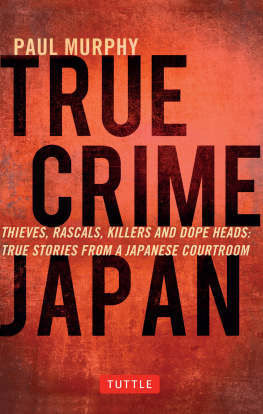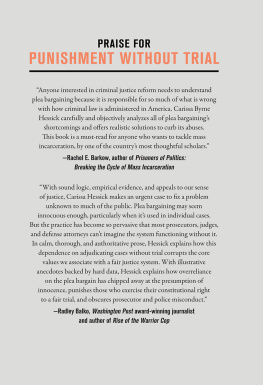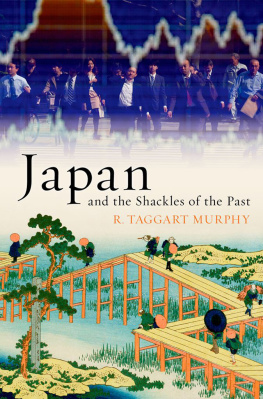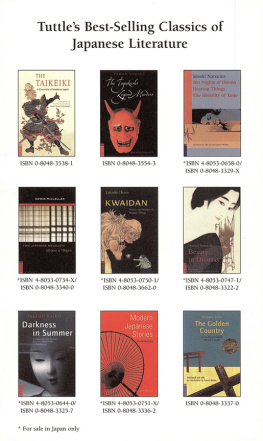ABOUT TUTTLE
Books to Span the East and West
Our core mission at Tuttle Publishing is to create books which bring people together one page at a time. Tuttle was founded in 1832 in the small New England town of Rutland, Vermont (USA). Our fundamental values remain as strong today as they were thento publish best-in-class books informing the English-speaking world about the countries and peoples of Asia. The world has become a smaller place today and Asias economic, cultural and political influence has expanded, yet the need for meaningful dialogue and information about this diverse region has never been greater. Since 1948, Tuttle has been a leader in publishing books on the cultures, arts, cuisines, languages and literatures of Asia. Our authors and photographers have won numerous awards and Tuttle has published thousands of books on subjects ranging from martial arts to paper crafts. We welcome you to explore the wealth of information available on Asia at www.tuttlepublishing.com .
ACKNOWLEDGEMENTS
I wish to thank my wife Maki for her love, support and wise insights about Japanese society and who, along with our daughter Nao, made an invaluable contribution to the research for this book. I also want to thank my brother David whose East Asian journalistic experience I have long tapped and who has been a sturdy influence in my life. Thanks as well to veteran Tokyo-based correspondent David McNeill for being a constant source of well-articulated wisdom on things Japanese and a great supporter and friend. Gratitude also to my other brother John for reading and commenting on certain chapters and to Ryann Connell, a generous friend and expert on Japan, for doing likewise.
I am indebted to the ever-professional clerks of Matsumoto Citys courts and to all who granted me interviews, especially lawyers Susumu Ozawa, Hirofumi Idei and Jiro Yamane, who greatly aided my understanding of Japans legal system. I wish to thank also Cian Ferriter and Martin Walsh: our long conversation about elderly crime on a train to Nagoya City persuaded me that there may be a wider audience for a book such as this. Thanks also to Diarmaid Ferriter, Mary Ruane and Michel Siochr, who in different ways influenced my initial journey to Japan, and to David Malatesta who insisted I learn the language once I got there. I also want to acknowledge the irrepressible Koji Ueda, who recently departed this life, Colm Comartn, Chie Matsumoto, Paul Rouse, Gregory Prendergast, Frank Shouldice, Masaru Misawa, Koichi Terao, Michiko Mutai, David Carlson, Miho and Hideki Shinohara, Shin and Rie Mutai, Angela Chen, Paula Brudell, Cormac Behan, Dnall King, Shane McGonigle, Mick Ryan and Takatsugu Nakayama. Very sincere thanks too to best-selling author and veteran crime journalist Jake Adelstein for sparing time from a hectic schedule to read a final draft and write a very kind endorsement. Finally, I wish to thank the staff of Tuttle Publishing for their encouragement, especially Cathy Layne for her impeccable advice and diligent editing skills and also Terri Jadick who so ably took up when Cathy departed to other pastures.

HOUSE PROUD
T wenty-one-year-old Michiru Hara didnt have a cell phone around the time her parents were planning to kill hera sure sign of a loner. In Japan, those without a cell phone are typically the very aged, the super-rich, the extremely poor, and the friendless. Michiru Hara appeared to be the latter. Neighbors told me they never noticed her with pals, and Michiru herself told Matsumoto District Court that she felt very lonely. Nobody sat with her in the courts public gallery during the three-day trial of her parents for attempted arson of their home.
A pleasant, shy girl, Michiru had big ambitions. She wanted to become a doctor, but had failed to get into medical college. So once she graduated from high school, she went to an expensive prep school to prepare for another attempt at the college entrance exams. Every weekday, her mother, Hitomi, or her father, Satoru, dropped her off at the local station so she could catch the train bound for her prep school in Matsumoto City.
In the evening, she took the 7:08 train back to her nearest station, Hakuyacho, nine stops from Matsumoto station. She was always collected by one of her parents. Her house was about three miles from the station; unlike the typical student, she didnt use a bicycle. And she didnt want to walk home. After 7:30 p.m., its dark, she said. There are hardly any street lights, so Id have to use a flashlight.
At home, the family ate dinner together; she chatted with her father or mother, but not about matters of importance, it seemed. When her dad changed jobs, for example, he never mentioned it.
So what did you talk about at home? a judge asked.
We talked about everyday things, about my school and what was happening on TV programs, just regular chitchat and gossip, she replied.
Michirus world revolved around her mother and father. She even slept in the same room as her mother. Until they are around 10 or 12 years old, Japanese children often sleep in the same room as their parents. The entire family typically sleeps on futon mattresses laid on a tatami-mat floor. It isnt unheard of for offspring with an unusual level of attachment to share a bedroom with their parents into adulthood, but its unusual. Michiru was one of the unusual ones.
Her parents had been married for 29 years and had ceased meaningful talk with one another. But Michiru got along with both of them, and though the word love was not mentioned in court, it seemed clear that she loved them and they loved her. By the time Michiru testified at her parents trial, she had dropped out of her prep school and moved into a small apartment in an area not far from her family home. She had been thrust into a reluctant independence, working three hours a day in a supermarket, earning around 60,000 yen (US$600) per month. She also got some money from her local social welfare office. Between the two incomes, she was left with about $800 per month after she paid for her rent. When she wasnt working at her part-time job, she studied on her own, still aiming to get into medical school.
She took the witness stand in the center of the courtroom, facing the judges. Her hair tied in a bow, she wore practical flat leather shoes and a dark business suit of a type popular among graduating university students who are job-hunting. While she had lost some weight since her parents detention, she was still chubby, and her face was covered in red blotches due to an ailment called Multiple Chemical Sensitivity (MCS), a condition that she shared with her mother and which, as we will see, was crucial to the tragic story of the Hara family.
Michiru read out the court oath, promising to obey her conscience, to tell the truth, and not to lie or embellish her testimony. She spoke clearly, though in a quiet, high-pitched voice. She was then reminded, as all witnesses are by the presiding judge, not to perjure herself. Her parents were represented by separate lawyers, who sat together across from two prosecutors. Her fathers lawyer began the questioning.
You are living alone now? he asked.
Yes. My relatives visit me and help me out sometimes, but I am mostly alone every day. I go to my job from 7 a.m. to 10 a.m., and after that I study for the university entrance exam.
Did you ever live alone before the incident?
No.
What do you do for food?
I eat food from the supermarket. Apart from cooking classes in school, I dont have any experience of cooking.
You lost weight.
Yes, I dont know how much because I dont have a scale, but I think I lost about 10 kilos [22 pounds].
Next page








